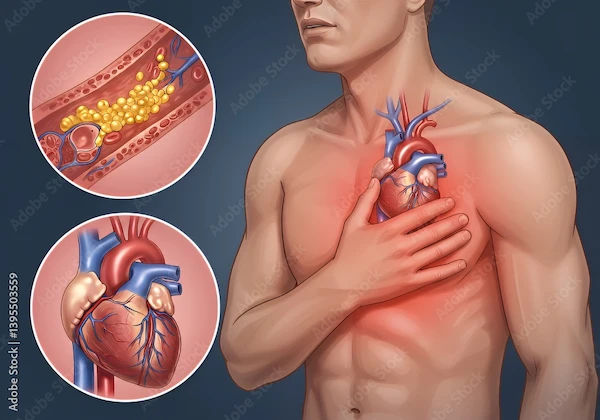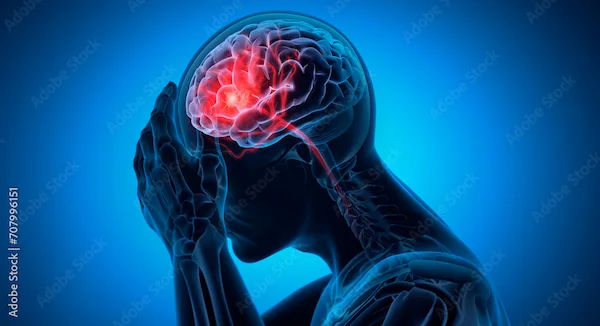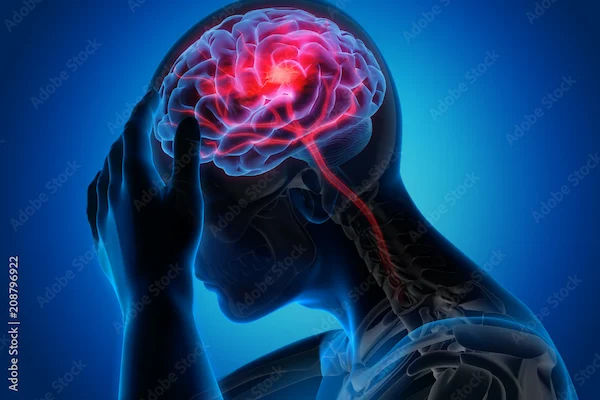Understanding Stroke Risk Factors: A Guide to Prevention and Awareness
Stroke is one of the leading causes of death and disability worldwide, yet many of its risk factors are preventable or manageable with the right lifestyle changes and medical interventions. Understanding the stroke risk factors is crucial for everyone.

Written by Dr.Sonia Bhatt
Last updated on 3rd Jul, 2025

What Is a Stroke?
Before delving into the risk factors, it's essential to understand what a stroke is. A stroke occurs when there is a sudden interruption in the blood supply to part of the brain. This can be due to either a blockage (ischemic stroke) or a burst blood vessel (haemorrhagic stroke). The brain cells that are deprived of oxygen and nutrients may die, leading to brain damage, disability, or even death.
Common Stroke Risk Factors
1. High Blood Pressure (Hypertension)
Hypertension is the most significant and preventable risk factor for stroke. When blood pressure is consistently high, it puts strain on the blood vessels, causing them to weaken, narrow, or even rupture. This increases the risk of both ischemic and haemorrhagic strokes. In fact, people with high blood pressure are twice as likely to suffer a stroke as those with normal blood pressure.
Actionable Advice:
Monitor your blood pressure regularly.
Follow your doctor’s recommendations for medication if prescribed.
To keep your blood pressure in check, eat a healthy diet, limit your salt intake, exercise regularly, and maintain a healthy weight.
2. High Cholesterol
Cholesterol is a fatty substance necessary for the body’s functions. However, too much of it can lead to plaque buildup in the arteries, which restrict or block blood flow to the brain. Low-density lipoprotein (LDL), also known as "bad" cholesterol, is particularly harmful when levels are elevated.
Actionable Advice:
Eat foods having low amount of saturated fats and trans fats, for example fruits, vegetables, whole grains, and lean proteins.
Get regular exercise, which can help lower LDL levels and raise high-density lipoprotein (HDL) levels, the "good" cholesterol.
Speak with your doctor about medications if your cholesterol levels are high.
3. Diabetes
Diabetes increases the risk of stroke by contributing to the development of high blood pressure, high cholesterol, and obesity—all of which are stroke risk factors in their own right. Moreover, blood vessels can be demaged by high blood sugar over time, leading to complications like atherosclerosis (narrowing of the arteries) that increase the risk of stroke.
Actionable Advice:
Keep your blood sugar levels under control through a balanced diet, exercise, and medication (if needed).
Monitor your blood sugar regularly and maintain a healthy weight.
4. Smoking
Smoking is one of the most significant preventable stroke risk factors. The chemicals in cigarettes damage blood vessels, making them more prone to clotting and narrowing. Smoking also raises blood pressure and decreases the amount of oxygen available to the brain, increasing the likelihood of a stroke.
Actionable Advice:
The best way to reduce your risk of stroke is to quit smoking.
Seek help from your doctor, a support group, or smoking cessation programs to improve your chances of quitting.
Avoid exposure to second-hand smoke, as it can also increase your stroke risk.
5. Obesity and Physical Inactivity
Being overweight or obese is a major risk factor for stroke, as it often leads to other risk factors such as high blood pressure, diabetes, and high cholesterol. Additionally, a sedentary lifestyle makes it harder to maintain a healthy weight and increases the risk of developing these other risk factors.
Actionable Advice:
Aim for at least 150 minutes of moderate exercise per week, such as walking, swimming, or cycling.
Include strength training exercises at least twice a week.
Work with your healthcare provider to develop a healthy eating plan and set achievable weight loss goals.
6. Atrial Fibrillation (AF)
Atrial fibrillation is a heart condition characterised by an irregular and often rapid heartbeat. This irregularity can lead to blood clots forming in the heart, which can then travel to the brain, causing a stroke. People with AF have a five-fold increased risk of stroke.
Actionable Advice:
If you have been diagnosed with AF, ensure you are following your doctor’s prescribed treatment plan.
Regular check-ups with your healthcare provider are essential for managing this condition and reducing the risk of stroke.
Blood-thinning medications (anticoagulants) are often prescribed to reduce the risk of clots.
7. Family History and Genetics
Family history plays a role in stroke risk. If your immediate family members (parents or siblings) have had a stroke, you may have a higher risk of experiencing one yourself. Genetic factors can influence conditions such as high blood pressure, high cholesterol, and heart disease, which are all linked to an increased stroke risk.
Actionable Advice:
Share your family history with your doctor, as this will help them better assess your individual risk.
Focus on controlling the modifiable risk factors, such as lifestyle choices and medication adherence, to reduce your overall stroke risk.
8. Age
Age is an unavoidable risk factor—stroke risk increases with age, particularly after the age of 55. As we age, our blood vessels become stiffer and narrower, which increases the likelihood of a clot forming and leading to a stroke.
Actionable Advice:
While you cannot change your age, you can work to reduce your other modifiable risk factors to help protect yourself.
Regular screenings and check-ups are important as you age so that any emerging risk factors can be managed early.
9. Excessive Alcohol Consumption
Drinking alcohol in excess can raise blood pressure, cause irregular heart rhythms (including atrial fibrillation), and increase the risk of stroke. Chronic heavy drinking can also lead to other conditions, such as liver disease, which further complicates stroke risk.
Actionable Advice:
Limit alcohol intake to no more than 14 units per week, spread over several days.
Consider alcohol-free days each week to help reduce your overall risk.
10. Stress
Chronic stress can contribute to unhealthy lifestyle habits such as poor eating, smoking, or excessive drinking, which all increase stroke risk. In addition, stress can directly affect blood pressure and the cardiovascular system, further increasing stroke risk.
Actionable Advice:
Engage in stress-reducing activities such as yoga, meditation, or deep breathing exercises.
Take time each day to unwind and practice relaxation techniques.
Make sure to get enough sleep, as poor sleep is also linked to high blood pressure and stroke risk.
Key Takeaways for Stroke Prevention
While some risk factors for stroke, such as age and family history, are beyond your control, many of the most significant factors are preventable or manageable with the right approach. By monitoring your health regularly and making changes to your lifestyle, you can reduce your risk of stroke and protect your brain health.
Keep your blood pressure and cholesterol levels in check.
Maintain a healthy weight and stay active.
Quit smoking and limit alcohol consumption.
Manage chronic conditions such as diabetes and atrial fibrillation.
Reduce stress and adopt healthy coping mechanisms.
Schedule regular check-ups with your healthcare provider.
By making these changes, you are taking proactive steps to reduce your stroke risk and promote better overall health.
Consult Top Neurologists
Consult Top Neurologists

Dr. Uddalak Chakraborty
Neurologist
8 Years • MBBS, MD(GENL.MED.),DM(NEUROLOGY)
Kolkata
MCR SUPER SPECIALITY POLY CLINIC & PATHOLOGY, Kolkata

Dr. Joydeep Biswas
Neurologist
15 Years • MBBS, DNB General Medicine, DNB Neurology
Barasat
Diab-Eat-Ease, Barasat
(25+ Patients)
Dr. Lakshaman K
Neurologist
19 Years • MBBS,MS General Medicine,MCH Neurosurgery
Bengaluru
R V speciality Clinic, Bengaluru
Dr. Annakula Ramu
Neurologist
7 Years • MBBS, MD General Medicine, DM Neurology
Jagtial
Sairam Neuro and Children Hospital, Jagtial

Dr. Swapnil Jain
Neurologist
7 Years • MBBS, MD (General medicine) , DNB Neurology
Jaipur
Tooth n brain clinic, Jaipur



.webp)
